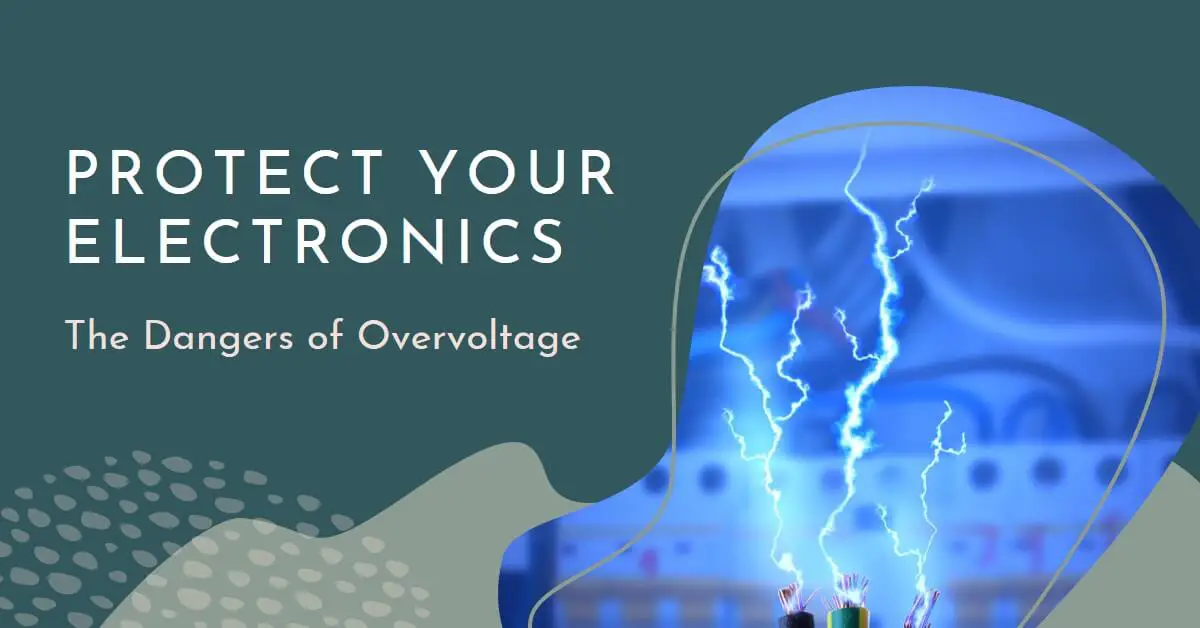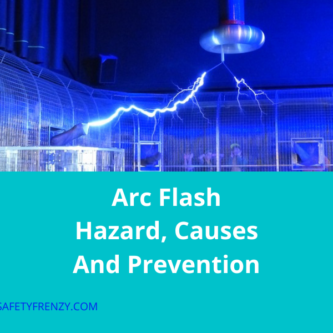Image: “Article Feature Image” by Bing is licensed under CC BY-NC-SA 4.0. Source: Bing Graphic Art. License: CC BY-NC-SA 4.0.
In today’s digital age, electronics have become an integral part of our lives, powering our homes, offices, and industries.
However, one often overlooked threat to these electronic devices is overvoltage. I will discuss with you the important question, can overvoltage damage electronics? Yes, overvoltage can damage electronics.
In this article, we will delve into the world of overvoltage and explore its damaging effects on our beloved gadgets. We will also discuss preventive measures to protect our electronics from this potential hazard.
Understanding Overvoltage:
Overvoltage refers to a situation when the voltage supplied to an electrical device exceeds its rated voltage.
It can occur due to various factors such as lightning strikes, power surges, faulty wiring, or malfunctions in the power grid.
While some voltage fluctuations are normal and within tolerable limits, excessive overvoltage can pose a significant risk to electronic equipment.
Effects of Overvoltage on Electronics
Impact on Electronic Components:
Overvoltage places excessive stress on the delicate components within electronic devices. It can cause permanent damage to integrated circuits, transistors, capacitors, and other sensitive components.
Over time, repeated exposure to overvoltage weakens the overall functionality and lifespan of these components.
Consequences on Circuitry:
When subjected to overvoltage, circuits can experience overloading, leading to excessive heat generation.
This heat can cause components to fail, circuits to short, or even result in electrical fires. Overvoltage can disrupt the delicate balance of a circuit, affecting its overall performance and stability.
Risks to Different Types of Electronics:
Overvoltage doesn’t discriminate; it poses risks to various types of electronics. Computers, laptops, televisions, refrigerators, air conditioners, and any other device connected to an electrical supply can fall victim to overvoltage damage.
The severity of the damage depends on the voltage levels and the device’s susceptibility to voltage fluctuations.
Read my article: Is Voltage Drop Killing Your Refrigerator? Here’s What You Need to Know
How Overvoltage Damages Electronics
- Overloading and Overheating: Excessive voltage can overload the components of an electronic device, causing them to draw more current than they can handle. This increased current leads to excessive heat, which, if left unchecked, can result in component failure and permanent damage.
- Burnouts and Electrical Shorts: Overvoltage can cause electrical arcing, resulting in burnouts and short circuits. When components such as wires or connectors are subjected to high voltage levels, they may burn out, leading to disruptions in the circuit and rendering the device inoperable.
- Internal Damage to Integrated Circuits: Integrated circuits (ICs) are the brains of electronic devices. Overvoltage can damage these intricate circuits by causing insulation breakdown, latch-up, or even complete failure. This damage may be immediate or manifest over time, gradually deteriorating the device’s performance.
Signs and Symptoms of Overvoltage Damage
Identifying overvoltage damage early is crucial in preventing further deterioration and potential failures. Here are some common signs to watch out for:
Physical Signs:
Look for burn marks, melted components, or a distinctive odor of burnt electronics. These physical indications often point towards overvoltage damage.
Operational Issues:
Devices affected by overvoltage may exhibit erratic behavior, sudden shutdowns, or an inability to power on.
Frequent crashes, freezing, or unusual error messages can also be symptoms of overvoltage damage.
Diagnostic Tools and Techniques:
Utilizing diagnostic tools such as multimeters or consulting with professional technicians can help identify overvoltage damage accurately.
They can analyze voltage levels, test components, and provide insights into the health of the electronic device.
Protecting Electronics from Overvoltage
Prevention is key when it comes to safeguarding our valuable electronics from overvoltage. Here are some effective measures to protect your devices:
Surge Protectors and Power Strips:
Invest in high-quality surge protectors or power strips with built-in surge protection. These devices act as barriers, diverting excess voltage away from your electronics and preventing damage.
Make sure to use surge protectors that are rated for the specific voltage and power requirements of your devices.
Uninterruptible Power Supplies (UPS)
Consider using uninterruptible power supplies, especially for critical electronics like computers or servers.
UPS systems provide a backup power source during voltage fluctuations or power outages, offering temporary protection and allowing you to safely shut down your devices.
Proper Grounding and Electrical System Maintenance:
Ensure that your electrical system is properly grounded to minimize the risk of overvoltage. Faulty or inadequate grounding can increase the chances of voltage spikes.
Regularly inspect and maintain your electrical system, checking for loose connections, damaged wiring, or outdated components that could contribute to overvoltage issues.
Voltage Regulators and Stabilizers:
For sensitive electronics or equipment that requires a stable power supply, consider using voltage regulators or stabilizers.
These devices regulate the voltage to ensure a constant and safe level, protecting your devices from both overvoltage and undervoltage.
Work with Qualified Electricians and Professionals:
When installing or modifying electrical systems, seek assistance from certified electricians or professionals.
They can help ensure proper wiring, grounding, and protection mechanisms are in place, reducing the risk of overvoltage damage.
Mitigating Overvoltage Risks
Electrical Codes and Regulations:
Familiarize yourself with local electrical codes and regulations. Adhering to these standards when installing or modifying electrical systems can help mitigate overvoltage risks.
Compliance with safety guidelines ensures the use of appropriate protection measures and reduces the likelihood of overvoltage-related issues.
Education and Awareness:
Promote awareness among household members or employees about the risks associated with overvoltage.
Encourage safe practices such as unplugging devices during electrical storms or utilizing surge protectors.
Educating individuals about the importance of protecting electronics can significantly reduce the occurrence of overvoltage damage.
Backup and Data Protection:
Back up important data regularly to prevent permanent loss in case of overvoltage-related failures. Use cloud storage, external hard drives, or off-site backups to ensure data integrity.
In the event of damage to electronics, having a backup allows for easier recovery and minimizes the impact on productivity or personal information.
Conclusion
Overvoltage poses a significant risk to our electronic devices, potentially causing irreversible damage and disruption.
By understanding the effects of overvoltage, recognizing the signs of damage, and implementing appropriate protective measures, we can safeguard our electronics, extend their lifespan, and avoid unnecessary financial burdens.
Stay vigilant, invest in quality protection devices, and consult professionals when needed to protect your valuable electronics from the damaging effects of overvoltage.
you work With Electricity! Don’t leave empty-handed!
Looking to stay ahead of the game in the world of electrical engineering? Subscribe to my YouTube channel and gain access to exclusive content you won’t find anywhere else!
The staff I recommend (Amazon Affiliate Links to products I believe are high quality):
- Economy 120 Volt/60Hz AC Power Source – Step-Down Voltage & Frequency Converters 1800W
- UNI-T Digital Multimeter Tester UT139C
- 50-Amp Extension Cord for RV “100ft”
- Voltage Stabilizer 110/220v
- Hair Dryer “best selling“
- TOSHIBA EM131A5C-BS Countertop Microwave Ovens
Disclaimer: This contains affiliate links to Amazon products. I may earn a commission for purchases made through these links.




